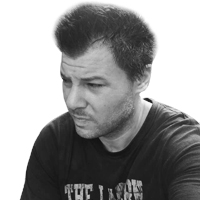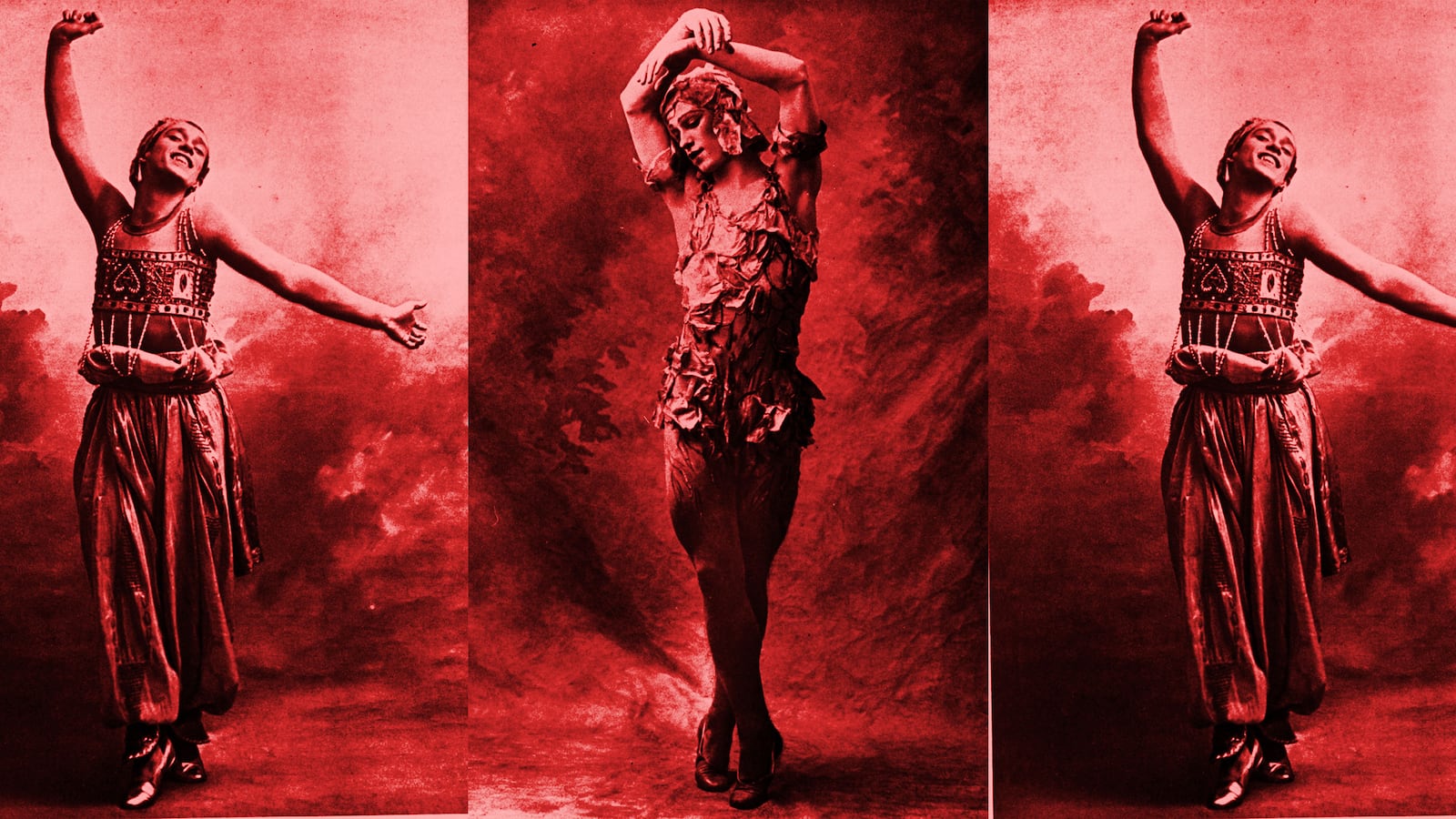The most infamous succès de scandale in the history of the ballet is, of course, the Ballets Russes’ 1913 production of Stravinsky’s The Rite of Spring. The production, particularly Stravinsky’s muscular, modernist score, caused a near-riot in the audience—sophisticated or not, ballet fans weren’t ready to have their envelopes pushed quite so far.
The choreographer for The Rite of Spring’s debut was in his early twenties and better known as a peerless dancer. Vaslav Nijinsky, a Pole who most people assumed was Russian, was a diffident man who was much teased, and, away from the stage, thought completely unremarkable. On stage, however, he was to dance what Hendrix was to the guitar and Rembrandt was to painting.
Today, it can be hard to understand why people got so worked up over a ballet highlighting a pagan interlude in which a young maiden sacrifices herself by dancing until she dies. But ballet a century ago was a more genteel affair. It is a little easier, though, to see the difficulties Nijinsky encountered a year before the Rite of Spring explosion when he choreographed and danced the principal role in a ballet set to Debussy’s The Afternoon of a Faun, in which he mimed masturbation with a scarf.
I come back to the subject of masturbation quite a bit with Nijinsky and how he thought, though not in that negative way of “mental masturbation.” It persisted as a theme throughout his life, and in what might be his most remarkable work, the only one by Nijinsky that is organically extant, given that there are no filmic records of his ballets. That one entirely extant work would be his diary, which he began keeping 100 years ago on January 19, 1919, sticking with it for only six weeks. Or, perhaps, the six weeks he needed it for.
The diary is usually used to make the case for Nijinsky’s insanity. By the time he started writing his journal, he had largely ceased to speak aloud. He no longer danced, despite being such a young man. His final performance had been in September 1917, on a bill—and what a night this must have been—with the pianist Arthur Rubinstein at a Red Cross benefit in South America. He was only 28, but he was far gone enough to make Rubinstein weep over the young man’s apparent schizophrenia.
Nijinsky had known some difficulties. His sexual entanglement with Ballets Russes impresario Sergei Diaghilev had not ended well, in part because he had gotten married to a woman who did not love him. Though she did stalk him. This was Romola de Pulszky, who lied and conned her way into the company’s touring party, purchasing first class rooms so that she could keep her eye on Nijinsky’s door, despite having been told that he was a homosexual.
Nonetheless, she persisted, button-holing his masseur so that she could learn the exact nature of Nijinsky’s musculature, the better to please him when her seduction reached its most rapturous phase, and to fuel her own masturbatory sessions. Bizarrely and out of the blue, Nijinsky, who had previously refused to have anything to do with her, sent an intermediary to convey an offer of marriage. This then actually happened (artists!)—after Romola accepted that it was not a cruel joke—and she then duly rejoiced on their wedding night when he did not attempt to have sexual intercourse with her. Not the kind of start your marriage is looking for.
Nijinsky’s ballets were too advanced even for regular ballet attendees, so after his dismissal from the Ballets Russes, he essentially had a unique job: The best dancer in the world, who was basically too good to be a part of any one company and too advanced and radical for anyone to employ, became a freelance All-Star who outclassed everyone inside of every joint, you might say. His talent was tantamount to a grand jeté that caused him to leap well beyond the hidebound, leaving him entirely alone on his planet of one. At that point, he stopped talking and began to write.
To write a diary is in some ways a masturbatory act, but also one that can bring healing and clarity (insert jokes as you will). Critics have attempted to frame Nijinsky’s diaries as an exercise in narcissism, because he often speaks of God and himself as though they were one and the same. Perhaps this is not surprising, since others had often compared Nijinsky to a god as well, as in “He no longer danced like a god,” in the words of one critic near the end of the dancer’s career.
Diaries fascinate me. Nijinsky’s was one of the ones I had in mind—along with Delacroix’s, Kenneth Tynan’s, Samuel Pepys’—when I decided to launch one for public viewing, as naked as possible, on my website, writing as though only to myself but opening up to all. We speak so often now about “our truth,” a fallacy if there ever was one, as truth is not something that we have dominion over. Truth owns us. It is what we answer to, whether we like it or not, whether we choose to try and expostulate this inevitably of human existence, or man- or woman-up and deal with it as best we can.
It can help to crack your mind open on a page. Writing about our thoughts and feelings can help to organize them. You start with words, not knowing where they might go, and you discover answers that you did not previously possess. You express truths, but you also write your way to truths.
That’s why I tire of the left-handed compliments trucked out for Nijinsky and his diary, the idea that he was some ego monster but brave.
“I am God. I am the spirit. I am everything,” Nijinsky wrote. His prose works with the circular, Circadian rhythms of a poetry that rests, awakes, zooms, realizes, countermands, retreats, reconsiders, sojourns, approaches again, backs off, overleaps, learns, processes.
As far as a pensée goes, “My madness is my love towards mankind” is tough to beat. The artist often has nothing in common with their fellow humans; and yet it is for their fellow humans, and the betterment of their lives, that artists give endlessly of themselves. This is a strange love, but I’d count it as the most valuable love there has ever been in this world, and I think Nijinsky would have felt the same.
As far as domestic love goes, he kind of goes off on his wife in the diary. He talks about his homosexuality. Like Montaigne, he does not stint on what I will call the flavors of experience. But the pungency smacks of life. He drew eyeballs throughout the pages of the diary, always with the eyeballs. But these were not all-peering eyes from the outside, they were reminders to plumb from the inside, to be the all-seeing sherpa of the moraines of the inner self. He’s quite practical, too, in a manner which can be witty, poignant, and make one say, “hmm, well, fair enough.”
His wife wanted to send him to Zurich for treatment, regarding which he writes in the diary, “I will not be writing much in Zurich, because I am very interested in that town.” Ah, sightseeing. Except, not quite: “I will go to a brothel because I want to have an intuitive understanding of tarts. I have forgotten tarts. I want to understand the psychology of a tart.”
You’re going to say, perhaps, that this is sexist, but I will say that this not the tone of the unregenerate but rather the quester, the searcher, he who is going to learn because there might be something larger in a subject than would seem at first. This, by the way, is what motivated Darwin, what motivated Dostoyevsky, what motivated Chekhov, what motivated the faun of the Debussy ballet, what motivates the mid-teen who first takes hands to genitals and explores new ideas of pleasure. It is this precocity of thinking that fuels every great artistic undertaking. And it’s also the driving force of the diary.
“I seek truth in a book and not the subject.” What he’s saying is that even though, in this example, his own example, he may be employing first person, it is not the person that it is the point. The point is the work, if it is any good, for that is always the real inviolable substrate upon which everything else goes atop. He simply conveyed this in aphoristic shorthand, which is both the diarist’s prerogative, and a part, at times, of the diarist’s penetrative, quickly advancing voice.
In the internet age, when we love to try and brand someone as the latest case example of narcissistic personality disorder, Nijnsky might get a smack or two, but I also think he wouldn’t at all. Some people, simply, are smarter than the rest of us. “People have nothing to do and therefore interfere with the life of others,” Nijinsky wrote. “I don’t want to interfere with the life of others.” If Facebook was ever going to hang a banner over everyone’s page, it ought to be that, these words from a century ago.
Nijinsky was put upon throughout his life, taken for granted by people who assumed that because he was a kind of god that his transcendent perfection was a given, that each and every time there was a mark to rise to, Nijinsky would rise to it, because how could it be otherwise? That is a hell of a way to have to live. No wonder he stopped talking to everyone. But the spirit? Is there enough water in the world, in all the other worlds that might have water, to extinguish one lick of flame of the true artist’s central spirit? Maybe. Maybe that’s when it’s truly over, when you have to leave this world. But it remained in place when Nijinsky composed his diary over those six weeks.
“Now I will dance you the war,” he wrote. “The war which you did not prevent.” That is the artist bringing it. There are all kinds of ways to dance, and never let it be said that a page is not a stage, and vice versa. For Nijinsky, their elemental pairing, the right pressure upon the right points, was the ultimate pas de deux.







